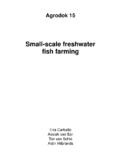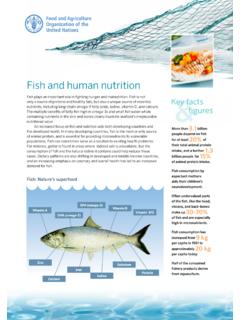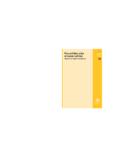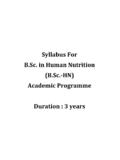Transcription of NORLAND PRODUCTS INC.
1 NORLAND PRODUCTS INC. Hydrolyzed fish Collagen Kosher Certified Halal Certified Nutraceutical Pharma Food Meets USP, EP and JP Specifications Hydrolyzed fish Collagen Hydrolyzed fish Collagen is a pure protein made up of amino acids1. These are the basic structural group for all proteins. While all proteins are made up of amino acids, not all proteins are collagen.
2 Collagens from all sources are composed of the same amino acids and have the same Chemical Abstract Service2 number 68410-45-7 no matter if they come from fish , cattle or pigs. The difference is the amino acids are in slightly different percentages and the acceptance or confidence that consumers place in the source, manufacturing and purity. Everyone needs to consume protein in order to provide the nutrition needed for daily life. If you are reducing your consumption of red meat, our Hydrolyzed fish Collagen can readily be added to your diet to insure you obtain the necessary protein.
3 There s no cholesterol, sugar or fat in our protein so it can be added to meals to provide a pure protein boost. When collagen is hydrolyzed, the protein molecules are broken into smaller molecules. A hydrolyzed protein will be easier to digest and will be absorbed by the body faster and easier than a non-hydrolyzed protein. The NORLAND Hydrolyzed fish Collagen (HFC) is manufactured from collagen which is the principal protein found in all animal skin and bones. While animal collagen is typically extracted from cattle or pig skin, our fish collagen is produced from the skins of wild, deep-sea, ocean fish such as cod, haddock and pollock.
4 Wild fish have no possibility of being exposed to antibiotics or hormones as is possible with farm raised animals or fish3. In addition, only the skins of kosher fish4 are used, so the HFC is able to meet the strict kosher standards of the Orthodox Union. These same skins and manufacturing conditions also meet the stringent standards of the Halal Food Council of South East Asia. NORLAND HFC is manufactured in Canada by Kenney & Ross Limited, a facility dedicated to marine PRODUCTS . At this facility the skins from the wild, deep sea fish are collected from food fish processors in Canada, the and Europe to provide quality raw material.
5 Prior to any extraction, the skins receive a lengthy wash with copious amounts of water. This step cleans the collagen and reduces the allergens to undetectable levels. It is only then that the collagen is ready to be hydrolyzed with a food grade acid and then further hydrolyzed with a food grade enzyme to break down the collagen s molecular weights. No genetically modified materials are used in this product or in any of our fish Gelatins or Collagens. After filtering, purification and concentration, the HFC is sterilized and spray dried to produce the powder that you receive.
6 The HFC is pure protein and is very water soluble with no off odor or taste. It can be used as a concentrated protein or additive for nutraceutical, cosmetic or food applications and will exceed the purity requirements of the United States, European and Japanese Pharmacopeias for gelatin. 1. Amino Acids are the chemical units or "building blocks" of the body that make up proteins. Protein substances make up the muscles, tendons, organs, glands, nails, and hair. Growth, repair and maintenance of all cells are dependent upon them.
7 Next to water, protein makes up the greatest portion of our body weight. Amino Acids that must be obtained from the diet are called "Essential Amino Acids". Amino Acids that the body can manufacture from other sources are called "NonEssential Amino Acids." 2. CAS registry numbers are unique numerical identifiers for chemical compounds. They are also referred to as CAS numbers or CAS RNs. The Chemical Abstract Service, a division of the American Chemical Society, assigns these identifiers to every chemical that has been described in the literature.
8 About 20 million compounds have received a CAS number so far, with about 4,000 new ones being added each day. The intention is to make database searches more convenient, as chemicals often have many names. Almost all molecule databases today allow searching by CAS number. 3. Barrionuevo A., Chile's Antibiotics Use on Salmon Farms Dwarfs That of a Top Rivals's, NY Times, July 26, 2009 4. A fish that is kosher will have scales and fins such as cod, pollock and haddock. Examples of non kosher fish are catfish, sharks, eels and rays.
9 All the skins used to produce our collagen are from food fish processing plants in Canada, the United States and Europe Research and the Health Benefits(a) of Hydrolyzed Collagen Osteoarthritis and Osteoporosis Many studies have been performed to determine if collagen hydrolysates help in the treatment of osteoarthritis and osteoporosis. Moskowitz1 reviewed the status of collagen hydrolysates in 2000 and Bello2 in 2006.
10 Moskowitz concluded that, Collagen hydrolysate is of interest as a therapeutic agent of potential utility in the treatment of osteoarthritis and osteoporosis. Its high level of safety makes it attractive as an agent for long-term use in these chronic disorders. Bello concluded, A growing body of evidence provides a rationale for the use of collagen hydrolysate for patients with OA. Laboratory tests indicate that the increased production of joint cartilage may be initiated by the ingestion of the hydrolyzed collagen while patient testing indicates that some of the peptide groups thought to be required to produce cartilage are absorbed by the blood3.





